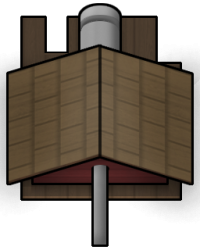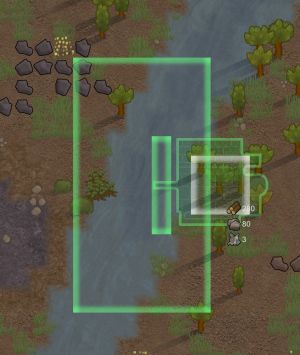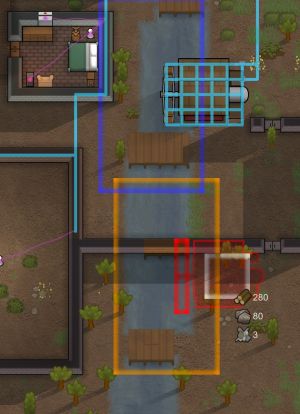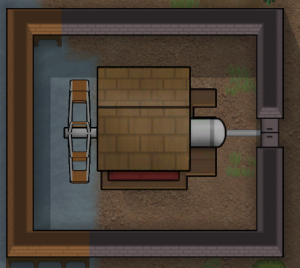Difference between revisions of "Watermill generator"
Aigh Newitt (talk | contribs) m |
|||
| (38 intermediate revisions by 8 users not shown) | |||
| Line 1: | Line 1: | ||
| − | + | {{infobox main|building| | |
| name = Watermill generator | | name = Watermill generator | ||
| − | | image = watermill_generator.png|128px | + | | image = watermill_generator.png|128px |
| − | | description = | + | | description = Produces electricity from a river. Must be placed with its wheel in moving water. If watermills are placed too close together, the turbulence they generate will interfere and reduce power generation. |
| − | | type = | + | | type = Building |
| type2 = Power | | type2 = Power | ||
| − | | placeable = | + | | placeable = true |
| + | | passability = impassable | ||
| + | | blockswind = true | ||
| + | | cover = 1 | ||
| + | | minifiable = false | ||
| size = 5 ˣ 6 | | size = 5 ˣ 6 | ||
| − | | hp =400 | + | | flammability = 1 |
| − | | | + | | hp = 400 |
| − | | power = | + | | beauty = -20 |
| − | | | + | | power = 1100 |
| + | | research = watermill generator | ||
| + | | skill 1 = Construction | ||
| + | | skill 1 level = 6 | ||
| work to make = 4000 | | work to make = 4000 | ||
| resource 1 = Wood | | resource 1 = Wood | ||
| Line 18: | Line 25: | ||
| resource 3 = Component | | resource 3 = Component | ||
| resource 3 amount = 3 | | resource 3 amount = 3 | ||
| − | + | }} | |
| − | + | '''Watermill generators''' are built on moving water to generate constant [[power]], regardless of weather or other conditions. | |
| − | + | ||
| − | + | == Acquisition == | |
| + | {{Acquisition}} | ||
| + | |||
| + | == Summary == | ||
| + | Watermill generators produce a constant 1100 W of [[power]] after being constructed. | ||
| + | |||
| + | Generators are temporarily disabled by sources of [[EMP]], with downtime scaling to the EMP damage dealt.{{Check Tag|Verify}} During this time, it will not generate any power. Unlike mechanoids, generators do not adapt to EMP and thus can be continuously restunned. | ||
| + | |||
| + | === Construction === | ||
| + | The watermill generator is unique in that it requires two different types of terrain: heavy terrain (i.e. solid ground, not mud or gravel) and moving water. This includes rivers and creeks, but not ocean. | ||
| + | |||
| + | The base is a 3x3 square in the middle of the housing (in white); the housing extends another 1 square beyond that, making a 5x5 square. Then, a 1x5 waterwheel is attached to one side of the housing, making the total footprint <u>5x6</u>. Only the 3x3 base must be on firm ground. | ||
A watermill generator must be placed: | A watermill generator must be placed: | ||
| − | #with its | + | # with its 3x3 base on tiles that can support Heavy (i.e. on solid ground, not on a bridge or marsh) |
| − | + | # with its water wheel entirely in moving water | |
| − | #with neither its housing nor wheel overlapping any other buildings or walls. | + | # with neither its housing nor wheel overlapping any other buildings or walls. |
| − | The | + | === Exclusion zone === |
| − | + | Watermills have an exclusion zone. They are 13x7 rectangles, extending 4 squares above, below and outside the mill. The output of watermills will be reduced to 30% (330W) if you overlap their exclusion zones. Water inside this zone has no effect - [[bridge]]s, [[wall]]s, and land inside an exclusion zone do ''not'' interfere with power generation. | |
| − | [[ | ||
When placing the watermill generator, the blueprint will show: | When placing the watermill generator, the blueprint will show: | ||
| − | + | * The 3x3 base of the generator (in white) | |
| − | + | * The 5x5 housing of the generator (green if placeable, red if not) | |
| − | + | * The 1x5 waterwheel of the generator off one side of that (green if placeable, red if not) | |
| − | + | * The exclusion zone, explained above (blue on previously built watermills, green if OK, flashing orange if overlapping) | |
| + | <gallery widths="300px" heights="600px" class="center" mode="nolines"> | ||
| + | File:Watermill-placement-OK.jpg|Good placement of watermill; green housing, wheel and exclusion zone. Note base (white) on firm ground but housing partially over water. | ||
| + | File:Watermill-placement-not_OK.jpg|Watermill placement not allowed (red housing & wheel, from overlapping wall), and exclusion zone overlapping (orange warning re -70% power penalty). Base in white. | ||
| + | </gallery> | ||
| − | + | == Analysis == | |
| + | [[File:Watermill-defense.png|thumb|300px|left|Despite being surrounded by wood walls, this watermill gives 100% power and is reasonably safe. Raiders will rarely, if ever, target this.]] | ||
| − | + | Watermill generators offer 100% consistent power, without requiring fuel, while also being cheaper to obtain and research than [[geothermal generator]]s. Therefore, watermills are a great source of power. Their main problem is map limitation, requiring a river or creek to build off of. And, because efficient watermills need to be spread out, they are slightly harder to defend than other power systems. | |
| − | [[ | + | === Defense === |
| + | In practice, watermills can be defended by surrounding them in [[wall]]s. Most [[raider]]s will not target anything enclosed in walls & doors if they have another target (colonist, targetable animal, or building) that is accessible without breaking a wall. [[Sapper]]s and [[breacher]]s will only break walls if it would be in their way. As watermills are created over water, it is unlikely for them to willingly pass through. Therefore, even [[wood]]en walls, constructed over [[bridge]]s, are sufficient to protect a watermill generator for the majority of cases. Double thick walls will help prevent casual grenade throws from breachers from opening up the generator to attack, as two such random attacks will be necessary to allow the raiders to target the generator. | ||
| − | + | === Exclusion zone === | |
| + | The -70% exclusion zone reduction does not stack. Therefore, given a sufficiently straight river, the maximum power output is achieved by cramming as many watermill generators along both sides of a river as possible. However, 3 overlapping watermills only give 90% the power of a single mill, and 4 would only give 120% power of a single one. It would take a very cooperative, straight section of river, and at least 8 watermills, 4 on each side, all side by side, to start to rival the 2,200W output of just 2 well-spaced watermills (and in just over the space required by 2). | ||
== Version history == | == Version history == | ||
| − | + | * [[Version/0.19.2009|0.19.2009]] - Added. | |
{{nav|power|wide}} | {{nav|power|wide}} | ||
| + | [[Category:Power]] | ||
Latest revision as of 19:45, 13 December 2024
Watermill generator
Produces electricity from a river. Must be placed with its wheel in moving water. If watermills are placed too close together, the turbulence they generate will interfere and reduce power generation.
Base Stats
Building
- Size
- 5 × 6
- Minifiable
- False
- Placeable
- True
- Passability
- impassable
- Cover Effectiveness
- 75%
- Blocks Wind
- True
- Power
- 1100 W
Creation
- Required Research
- Watermill generator
- Skill Required
- Construction 6
- Work To Make
- 4,000 ticks (1.11 mins)
Watermill generators are built on moving water to generate constant power, regardless of weather or other conditions.
Acquisition[edit]
Watermill generators can be constructed once the watermill generator research project has been completed. Each requires ![]() 280 Wood,
280 Wood, ![]() 80 Steel,
80 Steel, ![]() 3 Components, 4,000 ticks (1.11 mins) of work modified by the construction speed of the builder, and a construction skill of 6.
3 Components, 4,000 ticks (1.11 mins) of work modified by the construction speed of the builder, and a construction skill of 6.
Once constructed, they cannot be re-installed, they can only be deconstructed.
Summary[edit]
Watermill generators produce a constant 1100 W of power after being constructed.
Generators are temporarily disabled by sources of EMP, with downtime scaling to the EMP damage dealt.[Verify] During this time, it will not generate any power. Unlike mechanoids, generators do not adapt to EMP and thus can be continuously restunned.
Construction[edit]
The watermill generator is unique in that it requires two different types of terrain: heavy terrain (i.e. solid ground, not mud or gravel) and moving water. This includes rivers and creeks, but not ocean.
The base is a 3x3 square in the middle of the housing (in white); the housing extends another 1 square beyond that, making a 5x5 square. Then, a 1x5 waterwheel is attached to one side of the housing, making the total footprint 5x6. Only the 3x3 base must be on firm ground.
A watermill generator must be placed:
- with its 3x3 base on tiles that can support Heavy (i.e. on solid ground, not on a bridge or marsh)
- with its water wheel entirely in moving water
- with neither its housing nor wheel overlapping any other buildings or walls.
Exclusion zone[edit]
Watermills have an exclusion zone. They are 13x7 rectangles, extending 4 squares above, below and outside the mill. The output of watermills will be reduced to 30% (330W) if you overlap their exclusion zones. Water inside this zone has no effect - bridges, walls, and land inside an exclusion zone do not interfere with power generation.
When placing the watermill generator, the blueprint will show:
- The 3x3 base of the generator (in white)
- The 5x5 housing of the generator (green if placeable, red if not)
- The 1x5 waterwheel of the generator off one side of that (green if placeable, red if not)
- The exclusion zone, explained above (blue on previously built watermills, green if OK, flashing orange if overlapping)
Analysis[edit]
Watermill generators offer 100% consistent power, without requiring fuel, while also being cheaper to obtain and research than geothermal generators. Therefore, watermills are a great source of power. Their main problem is map limitation, requiring a river or creek to build off of. And, because efficient watermills need to be spread out, they are slightly harder to defend than other power systems.
Defense[edit]
In practice, watermills can be defended by surrounding them in walls. Most raiders will not target anything enclosed in walls & doors if they have another target (colonist, targetable animal, or building) that is accessible without breaking a wall. Sappers and breachers will only break walls if it would be in their way. As watermills are created over water, it is unlikely for them to willingly pass through. Therefore, even wooden walls, constructed over bridges, are sufficient to protect a watermill generator for the majority of cases. Double thick walls will help prevent casual grenade throws from breachers from opening up the generator to attack, as two such random attacks will be necessary to allow the raiders to target the generator.
Exclusion zone[edit]
The -70% exclusion zone reduction does not stack. Therefore, given a sufficiently straight river, the maximum power output is achieved by cramming as many watermill generators along both sides of a river as possible. However, 3 overlapping watermills only give 90% the power of a single mill, and 4 would only give 120% power of a single one. It would take a very cooperative, straight section of river, and at least 8 watermills, 4 on each side, all side by side, to start to rival the 2,200W output of just 2 well-spaced watermills (and in just over the space required by 2).
Version history[edit]
- 0.19.2009 - Added.



